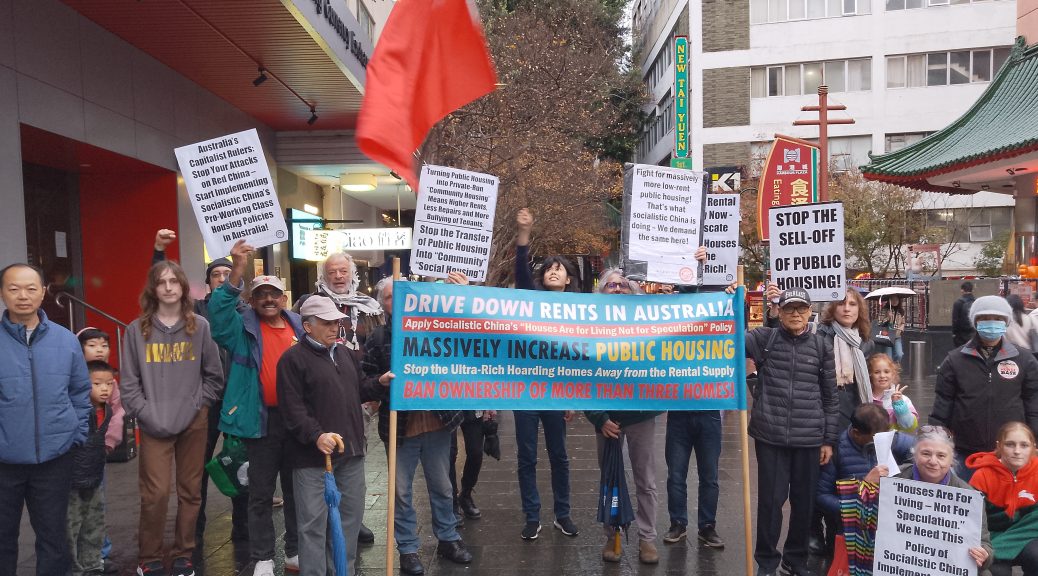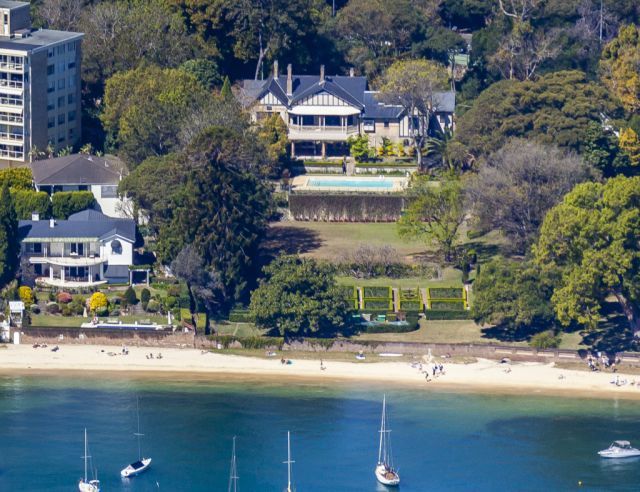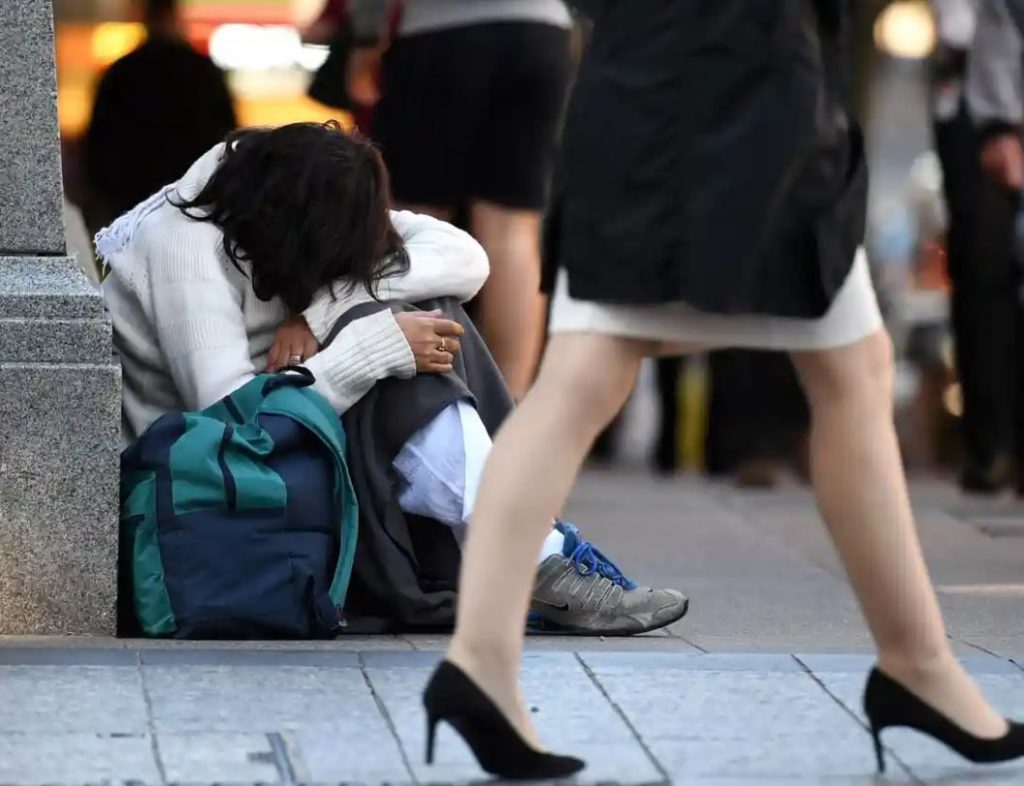As Chinese Premier Arrives for Australia Visit,
Rally Demands that China’s
Pro-Working Class Housing Policies
Be Implemented Here in Australia
Campaign Activates
to Drive Down the
Unaffordable Rents
in Australia
16 June 2024: Literally millions of Australia’s working poor, old-aged pensioners and unemployed workers are being driven into hardship by soaring rents and house prices. Therefore, to re-activate with new urgency a campaign to drive down Australia’s unaffordable rents, a rally and march was conducted yesterday to demand the measures needed to drive down rents. The action called for a massive increase in public housing and for the measures needed to release into the housing supply the vacant homes of the ultra-rich. The protest was organised by Trotskyist Platform and the Australian Chinese Workers Association.
Many of the measures needed here are being successfully implemented by the socialistic Peoples Republic of China to ensure adequate housing for her lower-income workers, younger workers and aged and disabled pensioners. That is why yesterday’s rally was timed to coincide with the visit to Australia of China’s premier, Li Qiang. As the call-out for yesterday’s rally put it:
“We demand that instead of delivering hypocritical lectures to China over `human rights’ and spending huge resources in a provocative military buildup targeting China, the Australian regime starts implementing China’s pro-working class housing policies. Australia’s super-rich ruling class are happy to take huge amounts of China’s money from their exports to China, we demand that they also take China’s `Houses are for living, not for speculation’-policy home!”
Yesterday’s action began with an introduction by rally emcee, Yuri Gromov, who is also the editor of The Spark – the journal of Trotskyist Platform. The following were his introductory remarks (all the speeches quoted in this article have been edited for publication):
“We are gathering here today on the stolen land of the Gadigal people of the Eora Nation to fight against the unaffordable rents and house prices in Australia.
“The housing affordability crisis indeed highlights the intense current and historic racist oppression that Aboriginal people face. The last census showed that the rate of homelessness for First Nations People was eight times higher than for the rest of the population.
“The lack of affordable housing and rental accommodation is hurting nearly all working class people. According to the Australian census in 2021 more than 122,000 people were officially homeless. Everyone can see from observing the streets that homelessness has surged since then. For every homeless person and for many more on the verge of becoming homeless, skipping meals and postponing essential medical and dental consultations is commonplace. Parents are faced with a terrible choice: not pay for a child’s school excursion or not to pay rent.
“The Sydney median rent is now $770 per week – 87% of the minimum wage for a full-time worker! Many younger workers are not able to get full-time work and so can’t afford rent. The rental crisis is also hurting older working class people. Many who are now living in caravans and cars are middle-aged and older single women.
“The lack of affordable accommodation is causing more domestic violence against women – many women in abusive relationships have no choice but to remain where they are to just keep a roof over their (and their children’s) heads.
“This crisis is a result of the failure of the so-called `free-market’ system. Profit-driven developers know that they can make more profit building extravagant homes for the wealthy than homes affordable to the poor. So, while the rich have many homes to buy up for themselves, there is a huge shortage of homes that working class people can afford to rent or buy.
“That is why we need public housing. Which is exactly what Australian governments of all stripes have been busy selling off. The proportion of people in public housing in Australia is now less than 3%. This proportion is half what it was 25 years ago. And this privatisation of public housing has been taking place whether it is the Liberals, the ALP or an ALP-Greens coalition in office.
“With so little public housing left, private landlords can jack up rents because tenants have nowhere else to go. So, we are here today to demand an end to all selloffs of public housing and, instead, call for a massive increase in public housing. With Australia’s capitalist government only serving the big end of town no matter which party is in office, we know that the only way we are going to win these demands is through mass struggle. Today’s rally is part of building for the type of mass class-struggle action that we need.
“With the rental crisis so severe, people need immediate relief even before more public housing can be built. Therefore, we call for measures to force the super-rich to release their vacant homes into the housing supply. The last census showed that 10% of Australia’s dwellings were unoccupied. Many of these are homes the super-rich keep just for speculation or as multiple vacation homes. Such housing speculation by the wealthy is encouraged through generous tax concessions that the government gives for negative gearing and capital gains. We say that these tax concessions should be ended and the public money that’s saved should be diverted into public housing. We demand a ban on people owning more than three homes. That way the ultra-rich will be forced to release many of their vacant homes into the housing supply.
“Ruling class commentators say that such restrictions on the `free market’ and a focus on public housing is impractical. They say that it is outdated and that it goes against the laws of economics. However, there is a huge problem with that kind of argument. For Australia’s biggest trading partner and the number one economic success story of the 21st century, that is the Peoples Republic of China, actually does have a focus on public housing and measures to reduce housing speculation. Indeed, the official name of China’s housing policy is: `Houses are For Living, Not for Speculation.’ Under this policy many parts of China restrict the amount of homes that the wealthy can own. In her capital Beijing, for example, only residents of the city can buy homes and are restricted to owning two homes per individual or family plus an additional home in the far outer suburbs.
“Moreover, socialistic China has focused on providing public housing for her lower-income people. More than one out of every four homes in China is now public housing. By contrast, just one out of every 36 homes in Australia belongs to the public housing stock.
“In just a few hours time, the Chinese premier Li Qiang will land in Australia for a high-profile visit. In the lead-up to the visit, the Australian media have been attacking China over supposed aggression and supposed `human rights violations’. We demand that instead of making such lying attacks on China, Australia’s capitalist rulers implement China’s pro-working class housing policies here. Working class people in Australia desperately need this.”
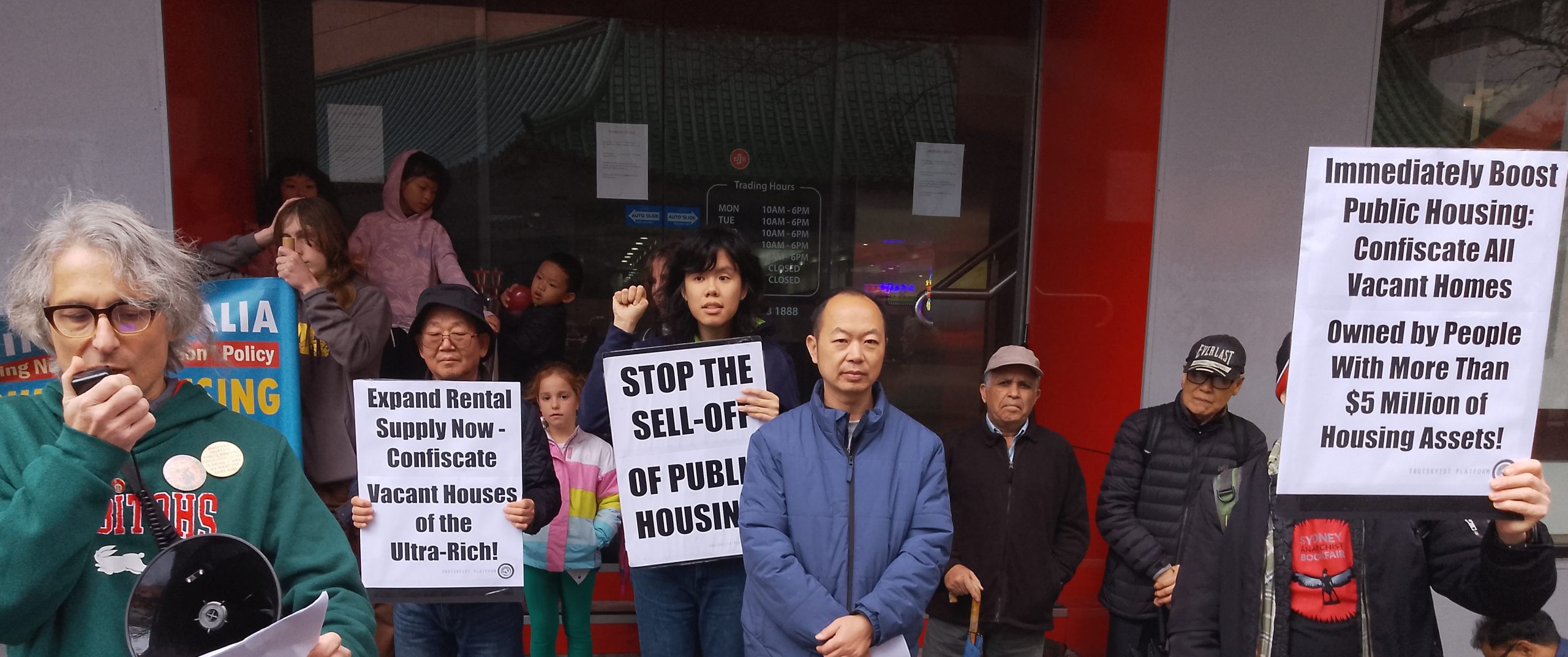
The rally was then addressed by Chairman of the Australian-Chinese Workers Association, David Chen:
“The Australian Chinese Workers Association is proud to be one of the endorsers of this action to fight for lower rents and lower housing costs. I want to acknowledge that we are gathering here on the stolen Aboriginal land of the Gadigal People of the Eora Nation.
“Rents have now reached unbearable levels for working class people. Even in working class Granville in Western Sydney, an area that I am familiar with, the median rent for a two bedroom apartment is now $500 per week. That is nearly 60% of the minimum wage for a full-time worker! Like our fellow working class Australians of all ethnicities, ethnic Chinese workers in Australia have been suffering under these increasingly unaffordable rents and housing costs. Like many other workers in this country, many Australian Chinese workers are not using heaters during the cold winter to be able to pay rent.
“The solution to these problems is obvious. We need to force governments of all stripes to massively increase public housing. Secondly, we need to release into the housing supply the huge number of homes that the ultra-rich keep unoccupied for speculation. To do this, we must insist that the super-rich be banned from owning more than three homes.
“Do not let politicians and media tell you that this is not practical. I want to share our experience as immigrants from China. In our home country, the government has focused on public housing over the last sixteen years. Moreover, to ensure that homes go to those who need them rather than being kept by the wealthy for speculation, most parts of China have policies restricting how many homes the rich can own. For example, in Guangzhou, the biggest city in the southern Guangdong province that I am from, people can own at most two homes. Moreover, in this mega-city, more public housing is now being built than private housing.
“So, such measures are indeed very realistic. But with Australian governments serving only the ultra-rich big end of town, they are not going to implement the policies that we need to lower rents unless we force them to. So Australian working class people of all ethnicities must unite to fight for a massive increase in public housing and a ban on people owning more than three homes. We in the Australian Chinese Workers Association pledge to do all we can to support this crucial struggle.
Rally emcee Yuri Gromov then provided additional detail on socialistic China’s pro-working class housing policies:
“China’s push on public housing began around 2008 and saw the state provide 70 million new public housing dwellings in the space of a decade. This included both low-rent public rental housing and low-cost public housing which was sold to lower-middle income occupants for a 70 year period and which the occupants could only sell back to the state.
“Today, China is making a renewed push to increase the amount of public housing. Most of the new public housing will be public rental housing. According to the 2021-2025 Five Year Plan, which China is ahead of schedule to meet, 6.5 million new public rental housing dwellings are being provided to house 20 million people. Even accounting for China’s big population, this is a further huge boost to public housing in China. Proportionate to population it is the same as if 375,000 people were to be granted public housing in Australia within five years. That is dozens of times more than what the Albanese government is even promising to provide.
“Notably, a recent Chinese government announcement made a few weeks ago stated that Chinese local governments and state-owned enterprises would begin aggressively buying up excess private housing and turning them into public housing. This is the direct opposite of the privatisation of public housing that Australian governments have been ruthlessly engaged in.
“China’s policies to stop housing speculation go beyond just the restrictions on the number of homes that people can buy. For example, China’s banks are not allowed to providing housing loans to people who already own two homes. Moreover, depending on the city, laws are made to discourage the purchase of second homes. Thus, in China’s biggest city, Shanghai, people seeking to buy a second home must pay a 35% deposit on the price, much higher than the deposit needed for people buying a first home.”
Next to address the demonstration was Trotskyist Platform central committee member, Samuel Kim. He has personally felt the sharpness of Australia’s rental affordability crisis, with his landlord recently putting up his rent by around 25% in one hit. Samuel Kim began his speech by detailing the suffering caused by rising rents: “Sisters and brothers, today over 400,000 women over 45 are at risk of homelessness according to the Housing for the Aged Action Group.”
The Trotskyist Platform representative then outlined a class-struggle strategy to fight for lower rents:
“Let’s make the rich sell off their excess homes! Housing is for living in, not for speculating! Australian billionaire Mike Cannon-Brookes owns $350 million worth of property – consisting of several unoccupied lavish mansions and holiday homes. That is why we in Trotskyist Platform demand that any dwelling owned by a household with more than five million dollars worth of property assets, and is unoccupied for more than two months within a year, should be confiscated and turned into public housing.
“But how are we going to win these demands? The Liberals, Far-Right parties and Teals/independents openly serve rich property speculators. Many of these politicians themselves own multiple properties. The ALP for its part always bows to this big end of town. And these ALP politicians also own multiple properties – Albanese personally once owned four properties and Tony Burke and Linda Burney both own five properties. The Greens do offer more for renters. But the Greens’ plans are not exclusively for public housing but will see public money handed over to private landlords for so-called “affordable housing”– money that should be used to build up public housing. Moreover, because the Greens accept the dominance of the capitalist economy, the Greens never deliver on their progressive promises.
“The only way we are going to win the measures needed is through mass struggle that can force the ruling class to grant us concessions. We must especially mobilise the industrial power of the union movement in this struggle. When governments attempt to sell off public housing this should be stopped through protest occupations – like the 6 August 2017 occupation of a block in Millers Point by leftists, trade unionists and other supporters of public housing. Similarly, we should build towards mass direct actions to requisition the unoccupied housing of the ultra-rich into the public housing stock. We should build a true workers party to organise such militant struggles and to build a class struggle fight for the conversion of all gig jobs into secure, permanent ones.
“If we are to succeed in such struggles, we must oppose the ruling class’ attempts to scapegoat migrants. It is a complete lie that migration is to blame for rising rents. After all the steepest rent rises were in 2021 when there was absolutely zero migration due to COVID travel restrictions. To stop the ruling class getting itself off the hook through diverting people’s frustrations onto others, we must go out of our way to defend the targeted groups. We must call for the full rights of citizenship for all migrants, refugees and international students. We must demand that the refugees imprisoned in PNG and Nauru be brought here and freed. And we must oppose all racist scapegoating of Aboriginal people.
“Sisters and brothers, the right to housing is one of the most basic of human rights. Yet the capitalist regime in this country, which poses such a threat to this right, also claims to be the guardian of `human rights’. In the lead-up to the Chinese premier Li Qiang’s visit, which will begin shortly, the ruling class media and politicians have been calling on Albanese to attack China forcefully over `human rights’ when he meets Li Qiang. But Albanese has no right to! For socialistic China does a far better job in ensuring housing for its masses than the capitalist rulers here. Thus, to ensure that the homes built there go to the masses, many parts of China have restrictions on the amount of homes that the rich can own. For example, in China’s biggest city, Shanghai, families and individuals are restricted to owning at most two homes. Furthermore, China has focused on providing public housing for her lower-income people. Today about 2.5% of housing in Australia is public housing, whereas in China it’s over 25%.
“So, actually, we say that it is Li Qiang who should be condemning the Australian regime for its appalling human rights failure – its failure to provide housing for all its people. And while he is at it, he should also demand that Australia’s capitalist rulers stop participating in Israel’s genocide of Palestinian people, stop its state forces from killing Aboriginal people in custody and free Australia’s four political prisoners.
“The differences in housing policy between Australia and China indeed highlight why our rulers constantly attack Australia’s biggest trading partner. For Australia’s capitalist rulers fear that the working class masses here will be inspired by socialistic China’s policies to start demanding China-style, pro-public housing policies in this country … and eventually to demand socialism as well!
“To be sure, pressured by a capitalist-dominated world and by the existence of capitalists within China, China’s transition to socialism is still unfinished, uncertain and deformed. Recently, under pressure from struggling privately-owned developers, Chinese cities have loosened, somewhat, anti-speculation policies. We say that there must be no loosening. Instead, the remaining major capitalist developers should be nationalised. There is no room for profiteers in a sector so connected with people’s well-being. This must be part of a broader program to further strengthen China’s socialistic public sector.
“For working class people here, it is important that China’s pro-working class housing direction and public sector-dominated economy remain in place. For the existence of that socialistic system strengthens our struggles for a housing and economic system in Australia that will finally look after working class people’s needs. That is why it is in the interests of working class people in Australia to oppose all the political, propaganda and military attacks against socialistic rule in China. Let’s oppose the U.S. and Australian regimes’ massive military buildup targeting China and its provocative naval missions in China-claimed waters in the East and South China Seas.
“It is important to know that Red China is able to provide large amounts of public housing for her people not only because of her policies. Her state is able to fund public housing because her economy’s most profitable sectors like energy, finance and mining are in public hands rather than being owned by wealthy tycoons. And because the majority of China’s big developers are state-owned, rather than profit-centred, public housing budgets actually go into providing public housing rather than into the pockets of wealthy capitalist contractors. Meanwhile, the fact that all China’s major banks are publicly owned means that these banks readily provide credit for public housing projects. So, a key part of fighting for the massive increase in public housing that we need here is to fight for the nationalisation of the banks and for the confiscation of Australia’s big construction and mining companies and their transfer into public hands. That in turn poses the need to struggle for an overall system based on collective ownership of the economy under the control of a workers government.
“The struggle for such a system that will meet the needs of all and not just the wealthy few will be built up through mass struggles for what working class people need right now. So, sisters and brothers: let’s work hard to build up a class struggle fight for a massive increase in public housing, for a ban on the ownership of more than three homes and for the confiscation of the unoccupied homes of the ultra-rich.”
Protesters then conducted a lively march through the streets of Sydney from Chinatown to the QVB. During the march we chanted: “More Public Housing!”, “Houses Are for Living – Not for Speculation!” and “Public Housing for You and Me – Just Like in the PRC!”.
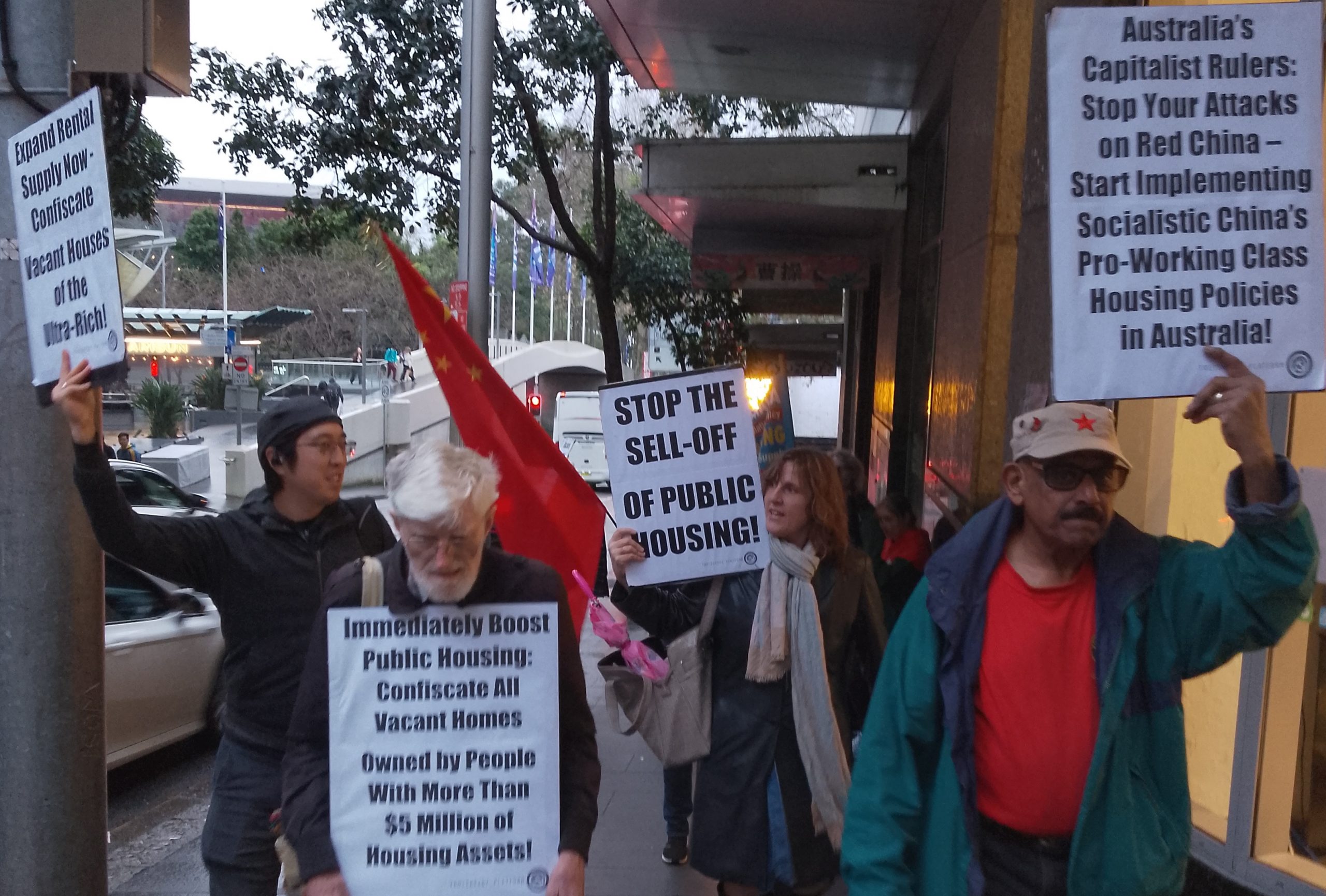
Outside the QVB Building, in front of a large bronze statue of Queen Victoria, that symbol of brutal British colonial power, rally emcee Yuri Gromov reiterated that the lack of affordable accommodation in Australia has nothing to do with immigration:
“The ruling class and the politicians, the media and the commentators who serve them are trying to get their capitalist system off the hook by blaming migrants. But more migrants means more people to build homes and more people to pay taxes to pay for building new homes. Migrants are not to blame for the housing crisis. Our working class sisters and brothers from all around the world are part of the solution. The rental crisis is caused by the failure of the capitalists and their so-called `free market’ system to meet the housing needs of the multicultural masses. The blame sits squarely on the shoulders of the pro-capitalist, pro-speculation policies of our governments and the massive selloff of public housing undertaken by successive Australian governments of all stripes.”
The final speaker at the action was activist Peter Butler, who has been fighting for decades for affordable rents and housing justice as a community worker, researcher and as a tenant himself. Peter Butler outlined how he saw the consequences of when local public housing estates around Campbelltown began to be sold off to private developers around the 1990s. He described the terrible effect this selloff had on many tenants, who then had nowhere to live. This was the result of neo-liberal policies, when housing became a source of profit, rather than a basic human right necessary for people’s security. Since then, things have gotten worse, with homelessness increasing, along with rental costs and shortages. Sydney is now the second-most expensive city in the world!
Now, a volunteer at a community food van, Peter Butler described the impact he has seen Australia’s rental affordability crisis have on many of his clients, with increasing pressure, especially on the most vulnerable. By comparison, in China, public housing is a common government provision.
Peter Butler noted that on the way to the rally, he saw several homeless people in the cold and rain, begging on the streets. He asked rhetorically: “Where would you rather live – in a secure apartment, even if it was small, or out on the streets?” Peter Butler insisted: “We need to return to more government provision of public housing for these people, instead of the emphasis of housing for the profit of a few.”
In his concluding remarks, rally emcee Yuri Gromov explained that: “the only way that we are going to win the housing policies that we need is through mass, class-struggle action. Today’s rally was aimed at building towards the type of action needed.” Indeed, the June 15 rally received much sympathetic interest from bystanders and passersby – many of whom stopped to pick up leaflets and listen to speeches. The demonstration was also sympathetically covered by an article in the Australian Chinese-language newspaper Sydney Today and re-published in Chinese-language news sites in Canada and China.
Buoyed by the spirited nature of the June 15 demonstration and the impact that it had, Trotskyist Platform and the Australian Chinese Workers Association have vowed to intensify their campaign to fight for lower rents. We intend to organise follow-up actions to demand a massive increase in public housing, a ban on the ownership of more than three homes and other measures to forcibly release into the housing supply the multiple homes kept vacant by the ultra-rich.
